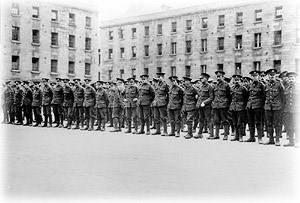Whether arrogant, or unable to read the will of the Irish people, Westminster’s response to the events of Easter 1916, prompted a sea-change in Irish politics. Summary executions and arbitrary arrests prompted strong public reaction against the Crown. A coalition bringing Carson into the British Cabinet, did little to maintain faith in the government’s commitment to implementing Home Rule after the war.

‘D’ Company, RDF, 1915.
The Irish Party failed to provide the kind of leadership demanded by the electorate and in the post-war general election, Sinn Féin won the vast majority of Irish seats. Eamon de Valera emerged as a political leader, refusing to take the seats at Westminster and establishing Dáil Éireann.
Those Irishmen serving in the Great War would see the 1916 Rising as a betrayal. They were dealt a double blow: not only did many high ranking British officers treat the Irish with suspicion and distrust after the insurrection, but many Irish civilians cast aspersions on them for serving in the army of the ‘oppressor’.
Easter Rising
When Redmond pledged support for England in the war to defend ‘small nations’, the Irish National Volunteer movement split. Those members of the Irish Republican Brotherhood holding powerful positions in the Volunteers, decided then to mount a rebellion against Britain. The Citizen Army, controlled by James Connolly, co-operated with the IRB leaders, culminating in the Easter Rising of 1916.
On Easter Monday, April 24, the rebels seized a number of buildings including the GPO. The 10th (Commercial) Battalion of the Royal Dublin Fusiliers repelled an attempt to take Dublin Castle. I.R.F.U. President, F. Browning, was one of five unarmed men unaware of the insurrection, killed in an ambush en route from an Easter Monday parade.
The Rising itself was short-lived and most Dubliners were either indifferent or actively hostile towards the rebels. At that time, hundreds of men in the 48th and 49th Brigades of the 16th Irish Division were being gassed in the trenches at Hulluch, near Loos. For the Irish soldiers at battle-fronts, the dead, the wounded and their families or friends at home, the Rising was a bitter betrayal.
The government, however, made an appalling mess of the situation. Treasonous though rebellion was, the Irish people had no taste for the executions and began to protest. Of ninety condemned men, sixteen were excuted. Martial law was imposed and more people than had participated in the Rising were arrested. Sheehy Skeffington, a pacifist, not a rebel, was arrested and shot without trial. Public outrage grew and over the next few months, Sinn Féin was the only party offering acceptable leadership.
Post-War Elections
In the 1918 General Election, Sinn Féin won 73 seats, the Unionists took 26 and the Irish Party was virtually wiped out, with only six seats. Eamon de Valera, had been involved in the 1916 Rising and was sentenced to death. Because he was born in the U.S. and Britain wanted to maintain good relations with America, his life was spared. Somewhat ironically, he won the East Clare by-election caused by the death of Willie Redmond, M.P. (brother of John). He now led the Sinn Féin M.P.s, abstaining from Westminster and declaring an Irish parliament, called Dáil Éireann.
Westminster’s attempts to quash Irish resistance to British rule was met with guerrilla warfare. Towards the end of 1921, they finally agreed the Anglo-Irish Treaty, which provided for the partition of Ireland, allowing the Unionists to remain within the United Kingdom. Nationalists split over partition. The bloody civil war which followed changed nothing about the Treaty arrangements.